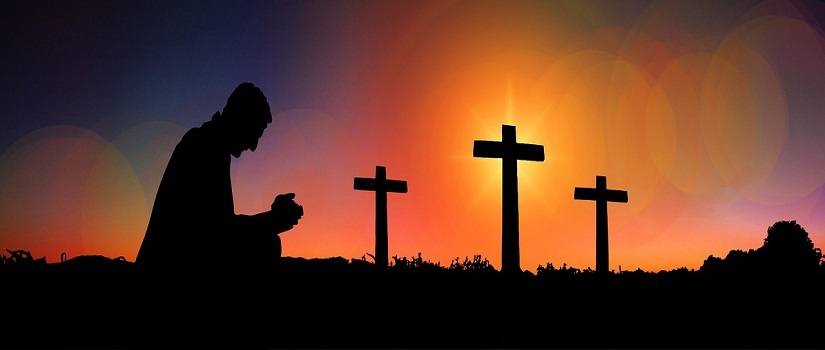THE TRANSFIGURATION OF JESUS CHRIST Part #2
THE SUBJECT OF THE CONVERSATION ON THE HOLY MOUNT:
Luke 9: 30. And, behold, there talked with him two men, which were Moses and Elias:
31. Who appeared in glory, and spake of his decease which he should accomplish at Jerusalem.
No greater assembly or conference was ever gathered. The Potsdam Conference (July-August 1945), at which American (Roosevelt), British (Churchill), and Soviet (Stalin) leaders drew up preliminary plans for the postwar administration of Germany and assigned various captured territories to Poland.
There have been other conferences when powerful world leaders have met to draw up boundary lines for nations, but no conference ever played a greater role in human affairs than this one on Mount Hermon.
Six of the greatest representatives of the human race gathered on that Holy Mountain in a conference at night. Three of them, the three disciples, were only listeners and reporters. Two were representing the departed Saints of Old Testament times, one of the Son of God.
And what was the subject of their conversation?
(1.) Was It Political?
Prophetic?
Did they talk about the fate of kingdoms?
Did they discuss the Roman rule of Palestine?
Did they talk about how the nations would be divided against one another?
Did they talk about the end of the world and the calamities coming on the world?
(2.) Was the conversation about heaven?
Did they talk about the beauties of heaven compared with Egypt?
Did they talk about the gates of pearl? The streets of gold? Walls of Jasper?
Did they discuss the foundation of the city, made of precious stones?
Did they talk of the grandeur of its ministry and melody of songs?
Did they talk about the blessedness of the heavenly state?
Did they talk about the unspeakable kingdom of heaven, the thrones and dominions, and powers?
(3.) Did they talk about the greatness of the Lord’s ministry? The preciousness of His promises? The purity of His precepts? The sermons He preached? The miracles He performed?
But none of that was discussed. Luke alone tells us what they talked about. And what was the subject of their conversation? Death.
The conversation on ‘the Holy Mount’ now falls upon our ears. They ‘spake of His decease which He should accomplish at Jerusalem,’ or the death of the Son of God.
When one is in a splendid company or when the soul is enraptured, men never speak of death. Never welcome, perhaps at any time, but now the topic of death would be least likely to be welcome. One is not likely wanting someone to warn them or even talk about their death.
Luke softens the word death by calling it ‘decease.’ We likewise use words like ‘they passed away,’ ‘he went to be with the Lord,’ ‘they are no longer with us.’ Even in circles of religious fellowship, it is not usual, as certainly it is not wise, to be always dwelling on death. The preacher’s words are ‘life,’ not death. And yet the very subject which is carefully excluded from worldly circles, and the very topic we do not like to think on, is precisely the subject selected for conversation by Moses and Elijah when they meet the glorified Savior on the ‘holy hill.’
Jesus’ death was no baby-like slumber-no gentle falling asleep. It was a death in all its hideousness, in all its bitterness, with cruelly aggregated horrors and fearfully augmented terrors. He drained the bitter cup for others, He underwent the baptism for sins, but not His own, He endured the cross, despising all pain and shame, for others.
His death for which Patriarchs and Pious persons under the Old Testament Dispensation looked and longed for and prophesied of was discussed. His death paid the price for their redemption as well as ours. All these looked on, and cheered, from the portals of glory as the Son of God became the Lamb of God and was sacrificed for the sin of all mankind.
Here on the Mountain were gathered three individuals who could look both ways, into the past and into the future, and reveal all the mysteries of God that have confounded men for many centuries. Moses and Elijah were well acquainted with all the prophecies of Daniel, of Ezekiel, of David, and a score or more of other men, who had written about the end times.
They, no doubt, had looked on as the prophecies were given by inspiration to those men. They, no doubt, had been in attendance in the courts of heaven for many centuries and understood all of the prophecies and their fulfillment.
We have all heard of the meekness of Moses, but of Elijah, we see here a different mannerism than we are accustomed to in the Bible concerning him. In the story of his life on earth, we found him all fierceness, fury, and fire in his dealings with Ahab and Jezebel, and Ahaziah. Now in the glimpse, we have here of his life in heaven, all the former traits have been exchanged for sympathy, tenderness, and concern.
It is noteworthy that all the New Testament glimpses of Elijah are of a similar character. He appears as the friend of the Sareptan Widow (Luke 4:25-26), the hopes of the Jews (Matthew 17:11-12), the restorer of parental fidelity, and national faith (Luke 1:17). So that “the wild figure, the stern voice, the deeds of blood which stand out in such startling relief from the pages of the old records, are seen by us, all silvered over with white and glistening light of the mountain of Transfiguration” (Smith’s Dictionary).
Yet why dwell on dying at all, in the midst of such a scene? Seems it not strange, to speak of Golgotha in the midst of glory? of the crown of thorns in the midst of the splendor that encircled His brow? Of stripes on His back in the midst of Holy Light?
What a proof here first of all, that the Messiah promised to the fathers was to be a dying Messiah. The head of the Mosaic, the head of the prophetic dispensation—men who, thoroughly understood both the prophecies and expectations of their times—are here together with The Christ; and what is the view they have discussed with Him? Is it as coming to reign as a great temporal prince, to confer worldly honors and distinction on His people, to deliver Judea from the Roman yoke? No; but as coming to die for the sins of the world!
What a proof here, again, of the interest taken in heaven in the death of Christ! A bright band of angels came to celebrate His birth. Two glorified men come to speak of His death. How intense must have been the anxiety in the upper world with reference to that event? And how the development of circumstances must have been watched until in the end the consummation was reached!
That was the one theme heard by Moses and Elijah before the throne; it is their one theme again before the sufferer Himself. What a rebuke to us all! How often is ‘the deceased accomplished at Jerusalem’ in our hearts and on our lips? The most matured Christian man will be the first to confess his shortcomings here, and admit that he thinks far too little of that redemptive sacrifice which has purchased for him everlasting glory.
How touching the insight presented here as the felt dependence of justified spirits on the work of the cross, and their solaces and comfort in view of its approach. What were the precise words of Moses and Elijah we are not told? There can be no doubt, however, that it was the in the language of gratitude, they spoke of ‘the deceased,’ especially as they remembered that, to its prospective power, they owed their seats in heaven.
The blood of Christ was to cover sins both before and after the cross. Old Testament sacrifices only rolled their sins ahead until they came to Calvary.
There is little doubt that Moses and Elijah came to cheer the great soul of Jesus, while looking forward to the ‘bitter cup,’ and pointed Him forward to a ransomed world and a rich reward, pointing Him to the period not too far distant, when, from another mountain, He should ascend to glory, His warfare over, and His work accomplished, to receive homage of cherubim and seraphim, and see the very ‘travail of His soul, and be abundantly satisfied.’
Taking this view of the matter, it no longer seems strange they should have spoken of dying on the hill of Calvary. No theme was so near the heart of Jesus. No theme was so ready to rise from His lips. His whole soul was absorbed in His unprecedented situation. Calvary and the cross were ever there.
He had tried to converse with his disciples concerning His death
(Matthew 16:21-23), but they were not open to the thought. He could not receive solace and encouragement from human sources so heaven sent their own representatives to comfort and encourage Him.
Their conversation ended Moses once again found the path that he had taken 1500 years previously and walked back to the glory world (Deuteronomy 34;p:1-6). Elijah simply stepped back on the waiting chariot of fire and was whisked back to heaven (2 Kings 2:11).
THE VOICE FROM HEAVEN:
Matthew 17:4 “Then answered Peter, and said unto Jesus, Lord, it is good for us to be here: if thou wilt, let us make here three tabernacles; one for thee, and one for Moses, and one for Elias.”
Luke 9:32 tells us that the three disciples were heavy with sleep. Awakening to see the glory and hear the conversation and experience the rapture of the occasion, as a Jew, at the presence of the two greatest heroes and leaders of his faith, under some fond delusion, it seemed to Peter that there was to be the commencement of the Messiah’s temporal reign—the rash apostle suggests the building of three tabernacles, where his Master, and Moses, and Elijah may dwell and be worshiped.
THE SHEKINAH APPEARS ON THE MOUNTAIN:
Matthew 17:5 “While he yet spake, behold, a bright cloud overshadowed them: and behold a voice out of the cloud, which said, This is my beloved Son, in whom I am well pleased; hear ye him.
Peter’s words have scarcely been uttered when the Shekinah of ancient days came down, and He who called Moses from the burning bush, and aroused the fugitive Elijah at Horeb, pronounces in the hearing of both—the Old Testament representatives of the Jewish Church—and in the hearing of the three disciples—the representatives of the future New Testament Church—the doing away with the old, and the full inauguration of the new.
‘This is My beloved Son, hear ye Him.’ Simon Peter’s tabernacles are not needed. Moses and Elijah have already been heard. Their office is done, their purpose finished, their day of toil forever completed. ‘The law was a schoolmaster until Christ.’ Now, ‘the testimony of Jesus is the spirit of prophecy’ (Revelation 19:10b.)
Moses and Elijah may go back to heaven, for Simon Peter’s Master is the one great teacher now, ‘hear ye Him.’ He is God’s beloved Son. He pleased the Father. He is the hope of all mankind, Israel’s judge and Israel’s seer must both give place to David’s Son and Israel’s King—‘they saw no man save Jesus only.’ (Matthew 17:8b.)
THE DISCIPLE FELL ON THEIR FACE UPON REALIZING THEY WERE IN THE PRESENCE OF GOD:
Matthew 17:6 And when the disciples heard it, they fell on their face, and were sore afraid.
Luke 9:34 “While he thus spake, there came a cloud, and overshadowed them: and they feared as they entered into the cloud.”
The cloud enclosed them all, so that that they could not be seen it was so large and dense, yet so bright and shining. Matthew 17:5 says it was “a bright cloud.” The cloud was a symbol of the grandeur and unapproachable glory of God. A similar cloud had descended upon Mount Sinai when Moses received the law from God (Exodus 24:15-18).
The disciples were admitted to this cloud that they might have a foretaste of future glory, and that they might be witnesses of what took place under the cloud, and especially that they might be able to give evidence throughout all ages of the voice which they heard come out of the cloud from “the excellent glory,” and Peter says “it came from heaven” (2 Peter 1:18).
The cloud was the veil of Deity, of the glory of Deity. The cloud abated and subdued the splendor of God’s appearance, which otherwise the mortal eyes of the disciples could not have borne.
We must also note the reaction of the three apostles, that they fell prostrate on their face as they were admitted into the presence of God Almighty. No man can stand in his presence in every instance I read where great men came into God’s presence they all fell prostrate before him. Paul informs us that the day will come when “every knee shall bow, and every tongue shall confess to the glory of God the Father” (Philippians 2:10-11).









